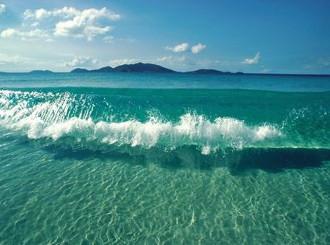
Africa's "Blue world" is made of vast lakes and rivers and an extensive ocean resource base. Thirty-eight of the fifty-four African States are coastal States. More than 90 percent of Africa’s imports and exports are conducted by sea and some of the most strategic gateways for international trade are in Africa, underscoring the geopolitical importance of the region. Maritime zones under Africa’s jurisdiction total about 13 million square kilometres including territorial seas and approximately 6.5 million square kilometres of the continental shelf. Mauritius with its 1850 square kilometres is one of the smallest countries in Africa and in the world. However, with its territorial waters, it becomes a country with 1.9 million square kilometres, the size of South Africa. Therefore, we have another Africa under the sea. Quite rightly, the African Union call the Blue Economy the "New Frontier of African Renaissance".
Africa’s aquatic and marine spaces are an increasingly common topic of political discourse; its natural resources have remained largely underexploited but are now being recognized for their potential contribution to inclusive and sustainable development. This "Blue world" is more than just an economic space— it is part of Africa’s rich geographical, social, and cultural canvas. Through a better understanding of the enormous opportunities emerging from investing and reinvesting in Africa’s aquatic and marine spaces, the balance can be tipped away from illegal harvesting, degradation, and depletion to a sustainable Blue development paradigm, serving Africa today and tomorrow. If fully exploited and well managed, Africa’s Blue Economy can constitute a major source of wealth and catapult the continent’s fortunes.
Africa’s economies continue to grow at remarkable rates, including through the exploitation of the rich endowment of land-based natural resources and commodity exports. Converting this growth into quality growth, through the generation of inclusive wealth, within environmental limits and respecting the highest social considerations, requires bold new thinking. It also involves the creation of jobs for a population on the rise. The Blue Economy offers that opportunity. For example, the International Energy Agency estimates that ocean renewable energy has a power potential sufficient to provide up to 400% of global current energy demand. Other estimates indicate that in 2010 the total annual economic value of maritime related activities reached 1.5 trillion euro. It is forecasted that by 2020, this figure will reach 2.5 trillion euro per year. Surely, Africa needs holistic and coherent strategies to harness this potential.
All water bodies, including lakes, rivers, and underground water, in addition to seas and the coast are unique resources, yet neglected and often forgotten. The largest sectors of the current African aquatic and ocean-based economy are fisheries, aquaculture, tourism, transport, ports, coastal mining, and energy. Additionally, the Blue Economy approach emphasizes interconnectedness with other sectors, is responsive to emerging and frontier sectors, and supports important social considerations, such as gender mainstreaming, food and water security, poverty alleviation, wealth retention, and jobs creation. The Blue Economy can play a major role in Africa’s structural transformation.
The approach advocated in ECA’s new Policy Handbook* is premised in the sustainable use, management and conservation of aquatic and marine ecosystems and associated resources. It builds on principles of equity, low carbon footprint, resource efficiency, social inclusion and broad-based development, with the jobs agenda at the centre of it all. It is anchored on strong regional cooperation and integration, considers structural transformation as an imperative for Africa's development and advocates for a complete departure from enclave development models. Instead, through better linkages to other sectors of the economy, it situates the aquatic and marine economies as part of integrated ecosystem services based on the harvesting of living and non-living resources, benefitting both costal, island states and landlocked countries.
Biotic resources allow Africa to expand its fishing, aquaculture, mariculture sectors and foster the emergency of vibrant pharmaceutical, chemical and cosmetics industries. The extraction of mineral resources and the generation of new energy resources provide the feedstock to resource-based industrialisation and places Africa at the centre of global trade in value-added products, no longer a supplier of unprocessed raw materials. Central to this agenda, is the need to modernise Africa's maritime transport and logistics services, its port and railway infrastructure, improve its reliability and efficiency with the view to seamless link the continent's economies to national, regional and global value chains as well facilitate tourism and recreation activities, just to name a few.
Africa has salutary examples of maritime, riparian and river-based cooperation and dispute settlement. This includes examples of maritime and transnational aquatic boundary delimitation and demarcation. A collaborative approach for the development of the Blue Economy will create the foundation for the formulation of shared visions for transformation. The Blue Economy development approach is an integral part of African Agenda 2063. Building on the experience with implementing Green Economy principles for a transition to low-carbon development, we are seeing an increasing number of African member States formulating Blue Economy strategies to diversify their economic base and catalyze socioeconomic transformation.
*Based on the foreword of Africa’s blue Economy; a policy handbook . An abridged version of this post has been published by the OECD Development Centre: https://oecd-development-matters.org/2016/06/07/africas-blue-economy-an-opportunity-not-to-be-missed/